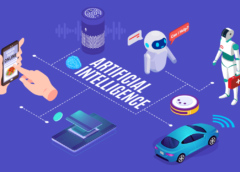The Future of AI in Everyday Life: Transforming Daily Activities from Smart Homes to Personal Assistants
Artificial intelligence (AI) has rapidly evolved from a niche technology into a transformative force poised to revolutionize our everyday lives. As AI continues to advance, its integration into various aspects of daily activities is becoming increasingly evident. From smart homes that anticipate our needs to personal assistants that streamline our tasks, AI is set to redefine how we live, work, and interact with the world around us.
Smart Homes: The Heart of AI Integration
One of the most prominent areas where AI is making a significant impact is in the realm of smart homes. These technologically advanced living spaces utilize AI to enhance convenience, security, and energy efficiency. Here’s how:
1. Personalized Living Experiences
AI-driven smart home systems can learn and adapt to the habits and preferences of the household members. For instance, smart thermostats can adjust the temperature based on the time of day and occupancy patterns, ensuring optimal comfort while reducing energy consumption. Similarly, AI-powered lighting systems can create customized lighting scenes that align with the user’s mood or activity.
2. Enhanced Security
AI is revolutionizing home security with intelligent surveillance systems that can recognize faces, detect unusual activities, and send real-time alerts to homeowners. These systems can differentiate between routine events, like a family member entering the house, and potential threats, such as an intruder, thereby providing a higher level of security and peace of mind.
3. Voice-Activated Assistants
Voice-activated AI assistants, such as Amazon’s Alexa, Google Assistant, and Apple’s Siri, are becoming integral components of smart homes. These assistants can perform a multitude of tasks, from setting reminders and answering queries to controlling other smart devices within the home. As these technologies continue to evolve, their ability to understand and respond to complex commands will further enhance their utility.
Personal Assistants: Redefining Productivity
AI-powered personal assistants are not confined to smart homes; they are also transforming how we manage our personal and professional lives. Here’s how AI personal assistants are set to redefine productivity:
1. Task Automation
AI personal assistants can handle routine tasks such as scheduling appointments, sending emails, and managing to-do lists. By automating these mundane activities, individuals can focus on more strategic and creative endeavors, thereby boosting productivity and efficiency.
2. Personalized Recommendations
AI assistants can analyze data from various sources, including calendars, emails, and browsing history, to provide personalized recommendations. Whether it’s suggesting the best time for a meeting or recommending a restaurant based on past preferences, these assistants can offer insights that are tailored to the user’s specific needs.
3. Health and Wellness
AI is also making strides in the health and wellness sector. Wearable devices equipped with AI can monitor vital signs, track physical activity, and even provide mental health support. These devices can offer personalized health insights and reminders, helping individuals maintain a healthier lifestyle.
The Road Ahead: Challenges and Opportunities
While the potential of AI in everyday life is immense, it also comes with its share of challenges. Privacy concerns, ethical considerations, and the need for robust security measures are some of the issues that need to be addressed as AI continues to integrate into our daily activities.
However, the opportunities presented by AI are boundless. As AI technology becomes more sophisticated, its applications will expand beyond smart homes and personal assistants to include areas such as autonomous vehicles, smart cities, and advanced healthcare solutions. The key to harnessing the full potential of AI lies in developing frameworks that ensure ethical use, data privacy, and security.
Conclusion
The future of AI in everyday life is a promising one, marked by enhanced convenience, improved efficiency, and personalized experiences. As AI continues to advance, it will undoubtedly transform the way we live, work, and interact with our environment. By embracing this technology and addressing the associated challenges, we can pave the way for a future where AI enriches our daily lives in ways we have yet to imagine.


